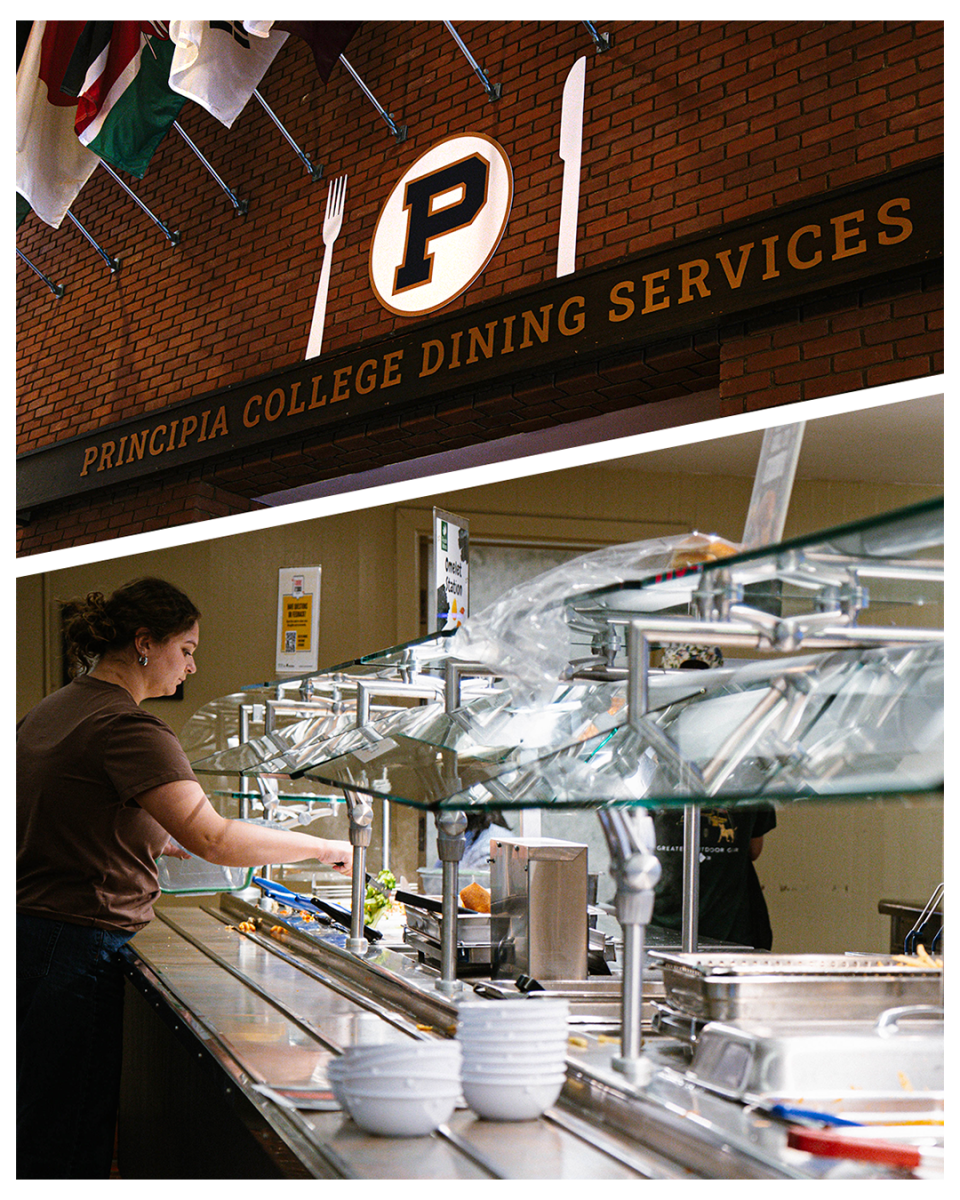Food security is becoming an increasingly prominent conversation on campus as more students say they struggle to manage rising dining costs. In response, two Principia faculty members have opened a food pantry, others have set up a sandwich station and others are investigating if there needs to be anything else done.
Students say a lack of transparency regarding meal prices has added to the challenge, with students often unaware of how much they are spending. The pub menu, for instance, has not been updated since spring, leaving many students in the dark about recent price changes. Additionally, dining prices have increased from last spring, prompting adjustments to the Panther Plan—the standard meal plan for students—which now offers 10.07 points per day, up from 9.52. Despite the increase in points, many students on campus say they are running out of points before the semester ends.
“I am very low on points, and I am worried about running out,” Freshman Kylie Huber, said voicing concerns over the limited budget her meal plan provides. “If I’m going to eat three meals [a day], I really can’t have a full meal for one of them, or if I’m going to have two, it can’t be a really full meal with vegetables, fruit, protein—especially as an athlete, that’s insane.” She said the lack of clear pricing at The Pub adds to the challenge. “I had no idea how much I was spending until I got my receipt,” said Huber.
Others agree. “They didn’t tell us prices would go up,” Ernesto Botero, a sophomore, said expressing similar frustrations about rising dining prices.
Students say they need accurate and clearly displayed food prices to make informed decisions on what to eat for meals.
Sophomore Anna Van Patten said until homecoming weekend, eight weeks into the fall semester, she had no clear idea of how much she was spending on items like bread, cereal with milk, and fruit, as prices were not readily visible.
Dining services has recently put out pricing for all their items. With the prices now visible, students better understand the cost of their meals.
“Now I actually feel like I know what I can buy to continue to balance my food budget,” Van Patten said, adding that the increased transparency helps reduce the shock on student meal plans, “It’s important to get a meal plan that supports your eating needs, but also I know some people can’t afford that.”
Botero shared a similar perspective. He explained that many students have financial commitments like bills and family contributions, leaving little room to afford a larger meal plan. “I don’t think the solution is getting a new meal plan,” Botero said.
One of the initiatives on campus aimed at addressing student food insecurity is the food pantry in the School of Nations. Dr. James O’Neil and Sky O’Brien, both visiting faculty, initiated the food pantry this semester, and said they were concerned about the increasing number of students attending classes hungry.
“It has often come up this semester about students coming to our classes hungry,” O’Neil said, highlighting the urgency that led them to establish the pantry. “We wanted to do something immediate; we recognized that this is a larger systemic problem that needs to be addressed by people who are above us in the chain of command, but the immediate need and goal is to satisfy hunger.”
The pantry, which is located on the first floor of the School of Nations down the hall from Philosophy Professor Chris Young’s office, includes food that can be eaten right away and that can be brought to the dorm to cook with at a later time. The pantry is entirely funded and stocked by faculty.
“Faculty are paying out of pocket for feeding our own students,” said O’Neil.
O’Brian described the support from faculty as “outrageously generous,” with O’Neil adding that “Support came from all corners.”
They said that restricted dining hours, reimplemented in the Fall of 2024, add to the challenge, forcing students to rush to eat and disrupting their ability to focus in class. O’Brien and O’Neil said the issue of food insecurity extends beyond dining services, pointing to a shift away from the traditional liberal arts model, where students should be able to immerse themselves in learning without worrying about basic needs, such as food. “We have moved away from a more traditional liberal arts focus on giving the students the experience and freedom to just learn,” said O’Neil.
“It’s like luring [students] out into the middle of nowhere and then not providing basic services,” O’Neil said.
O’Brien said he has hope for a future where the pantry is no longer necessary. O’Neil concluded that dining services should be treated as an essential service rather than a business aimed at profit.
The food pantry is not the only initiative to address student hunger on campus. Following a division meeting in the early Fall highlighting the overwhelming number of students reporting hunger and concerns about food insecurity, the Physics department set up a PB&J station in Science Center room 115, which is available to all students. Faculty members from the department have committed to taking turns restocking the station as needed, ensuring a steady supply of food for those in need.
Departments such as English, dance, theater, music, and history are among many that have raised concerns about food insecurity in their classrooms. Faculty members in these departments have acknowledged the issue and taken steps to help by providing snacks to students in need.
Faculty say this widespread awareness across different disciplines highlights the growing urgency of student hunger on campus and the shared commitment among faculty to support their students’ well-being.
The growing issue of food insecurity on campus has prompted community members to take action. While students say recent efforts to display accurate food prices have helped students better manage their meal budgets, many still say they struggle to afford adequate nutrition amidst rising dining costs. Initiatives like the Food Pantry in the School of Nations and the PB&J station set up by the Physics Department are examples of how faculty have stepped in to provide immediate relief. However, Faculty such as O’Neil and O’Brian say these measures are only temporary solutions to a larger systemic problem that requires a more sustainable and lasting approach.



